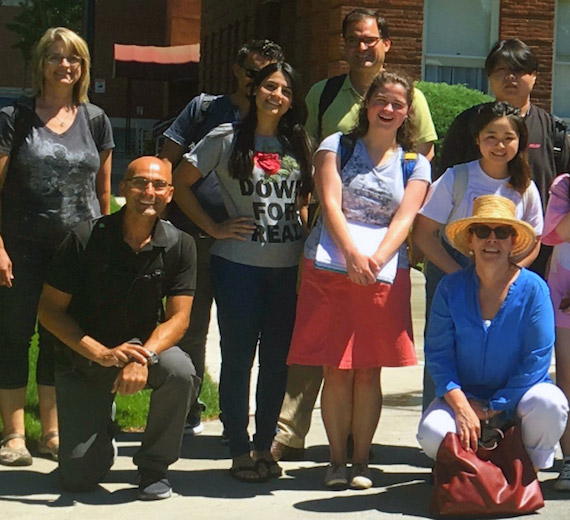Teaching Teachers to Teach

How do you teach 100-140 students in a classroom built for far fewer?
This is but one of the things the English Language Center’s Bridget Green is wrapping her head around as she prepares to travel to Uganda as an English Language Specialist with the U.S. Department of State in April.
Green is accustomed to the concept of creating something out of nothing, a technique that impressed her when she spent four years teaching English in Japan, where students often created their classroom resources and even bound their own notebooks, which they then used to do their schoolwork. In fact, it was the focus of this project—instructional materials development, Green’s specialty—that attracted her to the Uganda opportunity in the first place. “I teach Technology for Second Language Learning in the MA|TESOL program at Gonzaga, but I’m also very interested in teaching methods that strip out technology and introduce ways for teachers to use the knowledge and abilities of their students to develop their own resources,” she says.
The English Language Specialist program offers opportunities around the globe to promote cultural exchange and mutual understanding between the United States and other countries. Each project is different, and the one in which Green will participate has the potential to benefit thousands.
For the first four days of the 10-day course, Green will lead workshops at Bugema University instructing 15 English language teacher-training faculty in strategies for designing materials to teach English as a foreign language. That group will then train about a hundred undergraduate teachers-in-training, who will later be posted in cities and rural villages around Uganda to teach children English.
Working with the first group of teacher trainers is what Green is most excited about. “I expect there to be enough expertise in the first group of 15 that we’ll be able to figure out how to overcome any deficiency in resources.” Recognizing and respecting the expertise of those on the ground means that Green will be as much a learner as a teacher and is fully cognizant of the opportunity this represents: “I expect that I will benefit from this exchange personally, but also that my future students will benefit as I bring the strategies that they teach me back to my classroom here. It is truly an exchange in that sense.”
This is but one of the things the English Language Center’s Bridget Green is wrapping her head around as she prepares to travel to Uganda as an English Language Specialist with the U.S. Department of State in April.
Green is accustomed to the concept of creating something out of nothing, a technique that impressed her when she spent four years teaching English in Japan, where students often created their classroom resources and even bound their own notebooks, which they then used to do their schoolwork. In fact, it was the focus of this project—instructional materials development, Green’s specialty—that attracted her to the Uganda opportunity in the first place. “I teach Technology for Second Language Learning in the MA|TESOL program at Gonzaga, but I’m also very interested in teaching methods that strip out technology and introduce ways for teachers to use the knowledge and abilities of their students to develop their own resources,” she says.
The English Language Specialist program offers opportunities around the globe to promote cultural exchange and mutual understanding between the United States and other countries. Each project is different, and the one in which Green will participate has the potential to benefit thousands.
For the first four days of the 10-day course, Green will lead workshops at Bugema University instructing 15 English language teacher-training faculty in strategies for designing materials to teach English as a foreign language. That group will then train about a hundred undergraduate teachers-in-training, who will later be posted in cities and rural villages around Uganda to teach children English.
Working with the first group of teacher trainers is what Green is most excited about. “I expect there to be enough expertise in the first group of 15 that we’ll be able to figure out how to overcome any deficiency in resources.” Recognizing and respecting the expertise of those on the ground means that Green will be as much a learner as a teacher and is fully cognizant of the opportunity this represents: “I expect that I will benefit from this exchange personally, but also that my future students will benefit as I bring the strategies that they teach me back to my classroom here. It is truly an exchange in that sense.”
